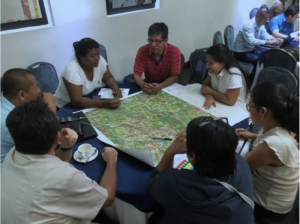
Costa Rica is one of the most vulnerable countries to climate change impacts, and more particularly to extreme hydro-meteorological events due to a combination of geographical location and economic factors. Impacts of climatic events are experienced inversely on both coasts: in other words, while droughts take place on the Pacific slope, floods are suffered on the Caribbean slope. Climate change impacts have created challenges for the agricultural and fisheries sectors – and will continue to do so.
Previous national adaptation experiences in the agricultural and fisheries sectors have shown the need to adapt the food systems rather than only focusing on its long-term transformation. The Adapta2+ experience has shown that the slow shift from traditional agricultural food value chains and agricultural practices to sustainable food production and consumption patterns will occur and will last by engaging governments, farmers, agro-industry, retailers and consumers. The program highlights the importance of enabling conditions for farmers and fishers of the private sector to increase local resilience to ensure the long-term impacts of the adaptation strategies. The need to reinforce local markets based on value chains for farmers, fishers and MSMEs, especially led by women, have been identified to upscale its results. Joining farmers, fishers, businesses along the value chain, community-based organizations, and local and national governments to work together would allow strengthening local markets.
Hence, escalating the existing finance options and creating new ones for the private sector would support the transformation of the agriculture sector and MSMEs. To do so, training and supporting finance institutions is key to show the profitability of financing adaptation. Building capacities in finance institutions also ensures the long-term impact and continuity of the program and its benefits.
For its implementation, the program is based on the six planning regions of Costa Rica, defined by the Ministry of Planning and Economic Policy (MIDEPLAN), and their corresponding counties. The project aims to benefit 4,000 producers (farmers and fishers), at least 50% are women; additionally, it will produce capacity building and dissemination of knowledge activities for at least 10,000 people (50% women); and provide around 230 loans granted to producers, MSMEs, and organizations within the six planning regions.
| Project Component 1: Improving the adaptive capacity of food systems and communities involved in the development of the territory, with a gender perspective | US$ 3,759,010.00 |
| Project Component 2: Strengthening access to climate finance for nature-based adaptation investments | US$ 2,750,000.00 |
| Project Component 3: : Capacity building and dissemination of knowledge for decision-making at the local, national and regional levels | US$ 1,850,000.00 |
| Project execution cost | US$ 857,580.00 |
| Total project cost | US$ 9,216,590.00 |
| Fundecooperacion Project Cycle Management Fee | US$ 783,410.00 |
| Grant Amount | US$ 10,000,000.00 |
Project Documents
| Attachment | Type | Size |
|---|---|---|
| Project concept | 2 MB | |
| Project document | 4 MB | |
| Inception Report | 1 MB |


